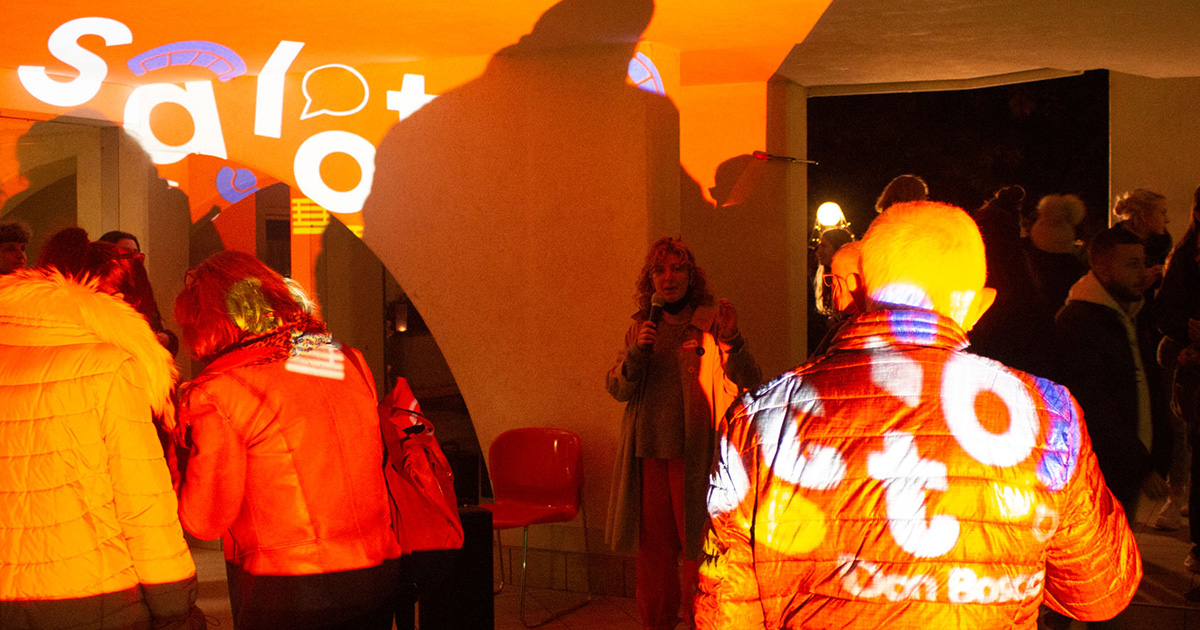All’interno del progetto Transforming the City by Care 10 team di student* del Master in Eco-Social Design stanno lavorando insieme alla cooperativa sociale OfficineVispa di Don Bosco, Bolzano, per un sviluppo del quartiere e della comunità nel senso di una trasformazione socio-ecologica verso un futuro più solidale e sostenibile. Particolare attenzione è data alle diverse pratiche sociali di cura e alle infrastrutture sociali, che permettono agli abitanti e alle parti interessate di prendersi cura del prossimo, dell’ambiente costruito e della natura. Il progetto è sostenuto dall’Ufficio Famiglia, Donna, Gioventù e Promozione Sociale del Comune di Bolzano.

Questa nuova edizione di TCC si basa su progetti passati per facilitare sviluppi desiderabili a lungo termine e si connette con molti attori diversi come associazioni, istituzioni, piccole imprese, persone della pubblica amministrazione, della politica locale e gli abitanti di Don Bosco. Dopo una fase di ricerca ed esplorazione iniziale, abbiamo dato il via al processo con l’evento partecipativo Salotto Don Bosco – Qui, i discorsi si accendono. Parte di esso è stata una mostra di progetti passati e 4 tavoli tematici, ognuno dei quali focalizzava la discussione su una questione importante per Don Bosco, … per finire con canederli e vino per tutt*.

Qua sotto vogliamo fornire un breve aggiornamento a tutte le persone coinvolte e inviare un grande ringraziamento per aver contribuito ed un invito a continuare a farlo! Riassumiamo molto brevemente i risultati di ogni tavolo tematico, e l’idea centrale di alcuni dei progetti in corso (scrollare sotto). Nella primavera del 2022 organizzeremo un altro evento a Don Bosco, dove saranno esposti e discussi i lavori allora più sviluppati, con la domanda centrale: Cosa continuare e come? Con chi e con quali risorse? – per migliorare la qualità del vivere e della collaborazione a Don Bosco, in tempi di crisi multipla. Sentitevi liberi di mettervi in contatto direttamente con ogni team di progetto, con OfficineVispa o con il team di docenti/ricercatori del Master in Eco-Social Design, che stanno lavorando al progetto complessivo.

I tavoli tematici
Le voci delle due tornate di discussione

Abitare e lavorare a Don Bosco
Moderatori: Sergio Previte & Kris Krois
Convivialità e infrastrutture sociali:
- Persone con il cuore ma mancano le strutture
- Sempre più muri, spazi chiusi (fisicamente e mentalmente)
- Cosa manca: feste e spazi di incontro, persone coinvolte
- Gli edifici sono “megastrutture” – ben fatti, ma c’è una sensazione di vuoto
- Manca il senso di convivialità tra gli anziani e tra le generazioni
- Manca l’attitudine a sperimentare le cose
- Ristabilire la Piazza
- Manca: la consapevolezza della storia
- Potenziale attore: le scuole locali
Spazio pubblico e mobilità
- Più piste ciclabili!
- Liberare lo spazio dalle auto
Abitare
- Discrepanza tra bassi salari e alti affitti – idee: Affitti controllati, licenza per essere un “buon” affittuario, sussidi all’alloggio per i giovani, controllo degli affitti
- Alcune persone, in particolare i giovani, non soddisfano i requisiti per gli alloggi sociali, ma non possono comunque permettersi i prezzi elevati del mercato
- Le persone saltano diverse aree della rete di supporto (non vengono intercettate)
- Se non puoi mostrare un contratto di lavoro a tempo determinato, hai poche possibilità di ottenere un contratto di alloggio – un problema per i giovani
Lavoro
- Don Bosco – area dove la gente vive per dormire, ma la maggior parte va altrove per lavorare (non ci sono molti posti di lavoro a Don Bosco)
- Necessità di stimolare attività commerciali, legate all’uso di spazi vuoti o sottoutilizzati
- Spazi di co-working – nessuno a Don Bosco! (ma in Via Roma ‘DRIN’ – un ex studente, Francesco Piazza, ci lavora)
Partecipazione e appartenenza
- Progetti partecipativi del passato: My BZ, lab:cafe, Salotto Don Bosco
- La partecipazione politica e la progettazione partecipata devono essere istituzionalizzate e vincolanti
- La gente di Don Bosco si sente lontana dal centro
- (Firmian: è molto separato da Don Bosco; mancano i servizi; spazi sottoutilizzati)

Educazione per le generazioni future
Moderators: Sofia Scroppo/ Lisa Bachmann & Michelangelo Lamonaca
- Young people need positive visions for the future in order to direct their energies towards a goal
- Fostering responsibility for a long-term commitment is crucial to the education of future generation, as it enables ties between individuals and promotes care for the lived environment and community
– projects that promote awareness on the environment and care for nature can be a good starting point for this, especially if done in collaboration with schools and the public sector - Beauty and dreams for the future need to come back into the forefront of attention, in order to raise a generation that is vibrant and energetic
- There needs to be a bridge between older and younger generations in order to fill the communication gap (students and young professionals could be this bridge)
- If education of younger generation is an issue, then maybe something is going wrong with regular frontal lessons and new approaches like sharing “Know-how” and other different teaching approaches need to be tried out and applied, as learning by doing is something that challenges and inspires the student.
- Create new perspectives for young generations to empower them; they should get active and contribute to the community/ positive development of Don Bosco

Comunità & appartenenza
Moderators: Laura Bordini
- No possibility to meet and interact with people
- People don’t know each other
- Difficulty of integrating all these different cultures in one place
- Changing of the urban landscape in a negative way
- Recreate a sense of community, bring back the sociality that there was in the semirurali period
- Make young generations feel more close to that period
- Organize events in the open space and in the public gardens
- Involving school, attract young generation
- Understand the problem of immigration : once, people help each other and were welcomed. Now people distrust, don’t have common goal
- The square was useful yesterday, now each compound of buildings has a square but it is not used > give a reason to meet
- Create a club of semirurali (for retired people)
- Redesign the museum of Semirurali
- Reacreate beauty founding a new community aim

Progettiamo insieme
Moderators: Silvia & Erica/ Lisa Bachmann
- Citizens want to contribute to projects with their opinion
- Part of the dwellers are highly interested in contributing to the cities projects regarding Don Bosco and they are already engaged. How can we reach the others?
- Gap between generations
- Importance of history of the area –> piazza Don Bosco
- Possibilities to meet and interact with others
- Bring points of interest to Don Bosco

Short summery of each some ongoing project – Una breve sintesi alcuni progetti in corso
COMPANE
Company through making bread
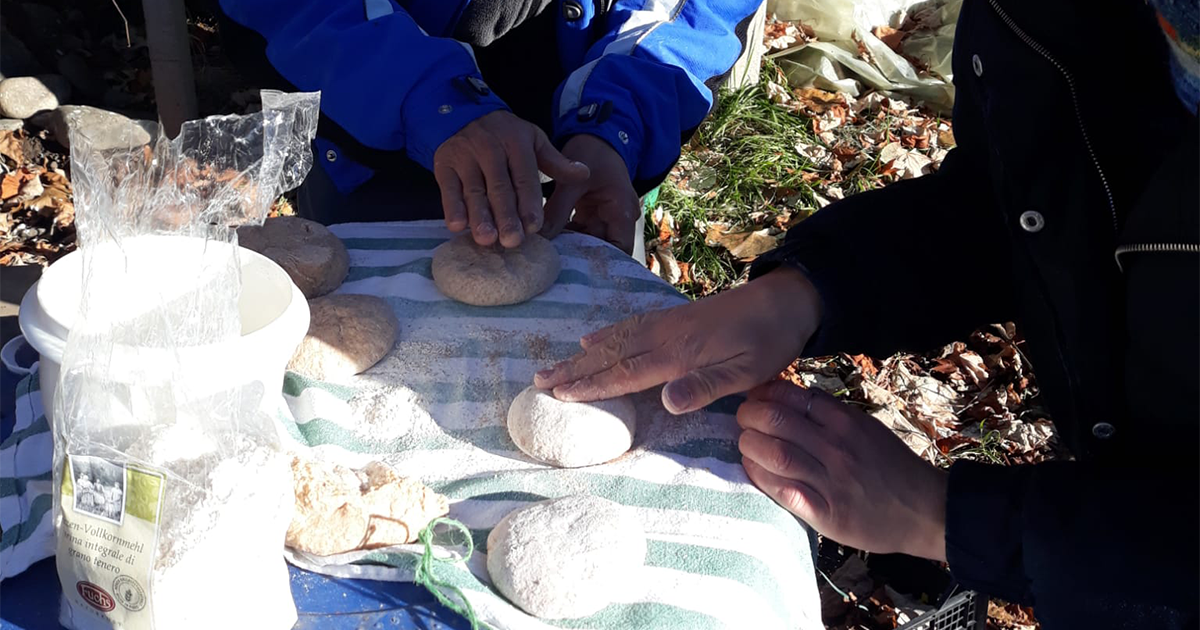
A stone oven in the community garden behind the historically valuable “Casa Semirurale” is the basis of our project. With the help of organizations and the neighbourhood of Don Bosco, we would like to create monthly bread baking meetings that create space for community, intercultural exchange and a culture of togetherness and sharing.
Student team: Pauli Eberhardt, Anna Schuierer, aschuierer@unibz.it
Partners/stakeholders: Donne Nissà, CoolTour, OfficineVispa, Schlössl Mühle
MEZO
The cleanness of Impurity

Creating a circular neighborhood through a shift of values. Nudged by the transformation of waste oil into a tangible artefact: soap. A simple product which is reinterpreted by repurposing old frying oil from a local fast-food restaurant as a precious ingredient and transports personal stories by shaping it together with the community.
Student team: Chiara Simpson, Jakob Kaufmann, Maiella Di Donato, mdidonato@unibz.it
Partners: Mezopotamia, OfficineVispa, NOI Techpark, Elisa Nicoli
proiéttàti
verso un abitare universalmente accessibile / Turns on the spotlight towards accessible housing for all
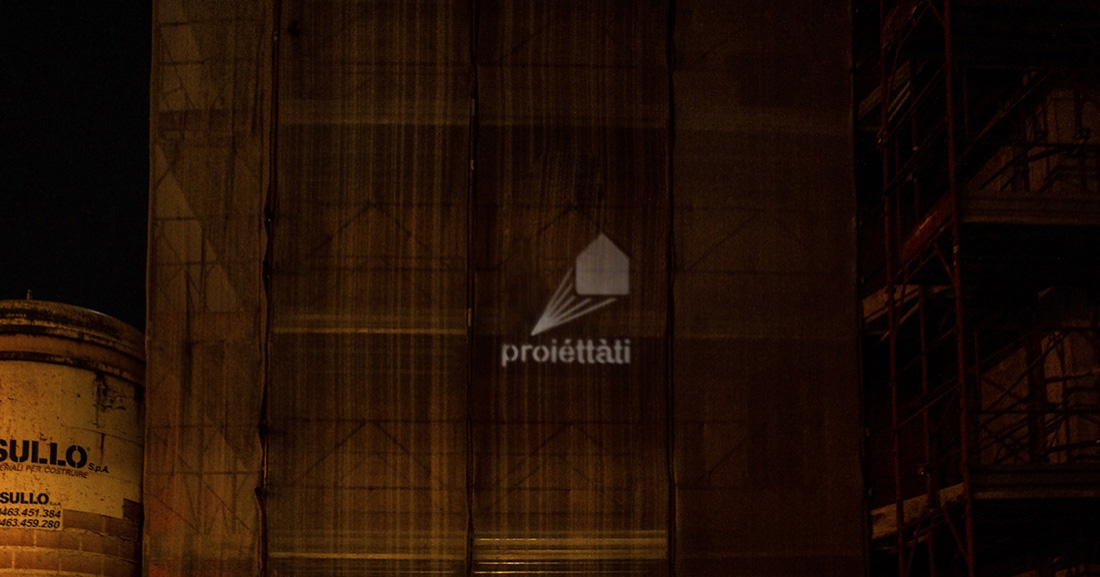
Access to housing is a human right. Yet for many people in Bolzano this right is not being met, despite evidence showing that the resources are already here; there are enough living spaces and different forms of support do exist. In our project we aim to illuminate stories and experiences of individuals and organisations that are connected to this issue. Through a provocative awareness campaign, we want to draw attention to the barriers that people are facing and spark public conversation, putting pressure on decision makers to act.
Are you a young person living in Don Bosco? We want to hear more about your housing story and experiences. If you would be interested in contributing to the project, then please get in touch! Email us at proiettati@aol.com.
Blog: www.salto.bz/de/users/proiettati-bolzano
Student team: Arthur Holt, Luisina Figueroa, Sofia Scroppo, Hannah Marti
Partners: OfficineVispa
L’ARTE SONO IO
alternative economy

The project’s aim is to give Don Bosco’s unwanted clothes a new lease of life. By working in partnership with Don Bosco Social and SEAB, we aim to save clothes from a future in landfill, and instead create an alternative future. Through ‘visible mending’ and reselling items from the bins, we hope to create a new network and value for unwanted clothes in Don Bosco.
Student team: Cecilia Barbero and Mollie Edge cbarbero@unibz.it
Partners: Don Bosco Social and SEAB
FARSI LUOGO
Visual dialogues about the future of Piazza Don Bosco
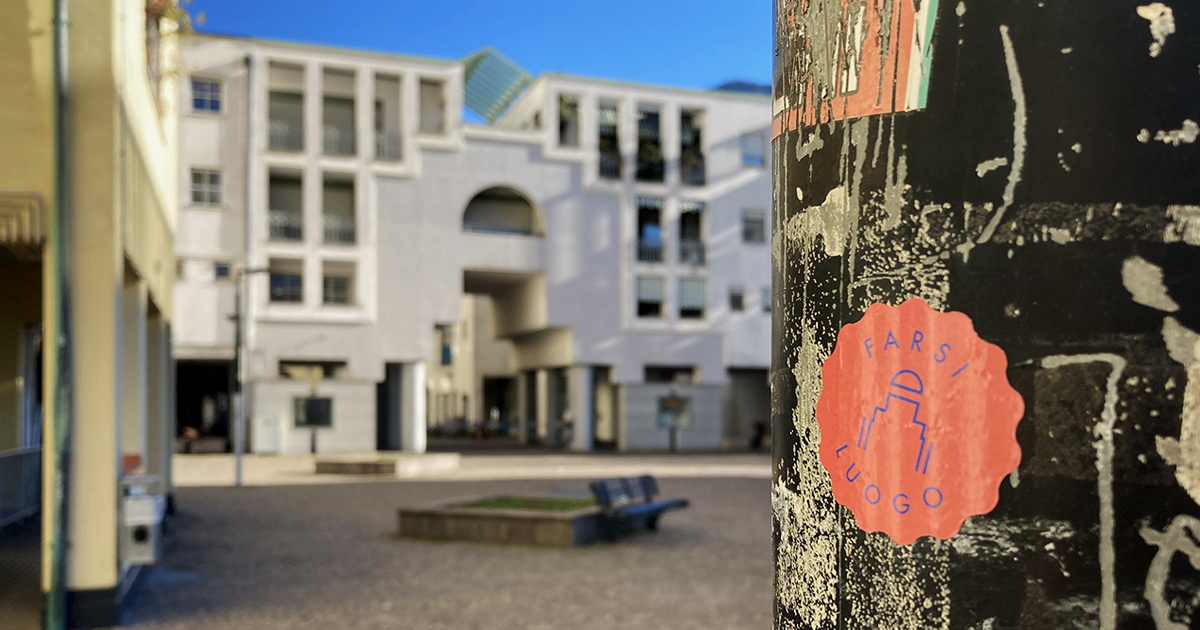
We are faced with cold public spaces that are more designed for passing by than for living in them. This is the case of Piazza Don Bosco, previously the heart of the neighbourhood, in which people used to connect and share. We would like to make the collected wishes and needs visible, to inspire future projects.
Student team: Laura Bordini (lbordini@unibz.it ), Maria Eugenia Gonzales, Sarah Doetsch
Partners: OfficineVispa, WOBI, IPES, Alex Castellano, Don Bosco Social, Circoscrizione, Bottega di cultura
KIN
Commoning and communing through nature
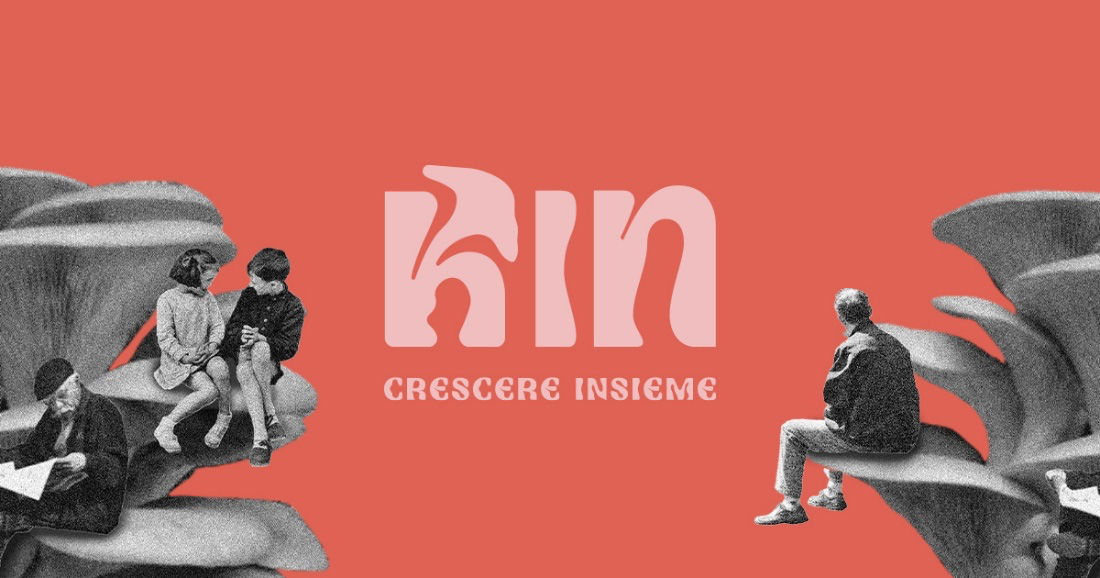
KIN builds community resilience and reciprocity by bringing people together to co-create circular mushroom community-owned farms. We aim to reconnect urban dwellers with a sense of deep interdependence with the living world while providing new pathways towards food sovereignty.
Student team: Blessing Yen, Emma Fourie, Erika Braccini (byen@unibz.it)
Partners: OfficineVispa, Donne Nissà
The Future is Handmade
Revolution is in our hands!
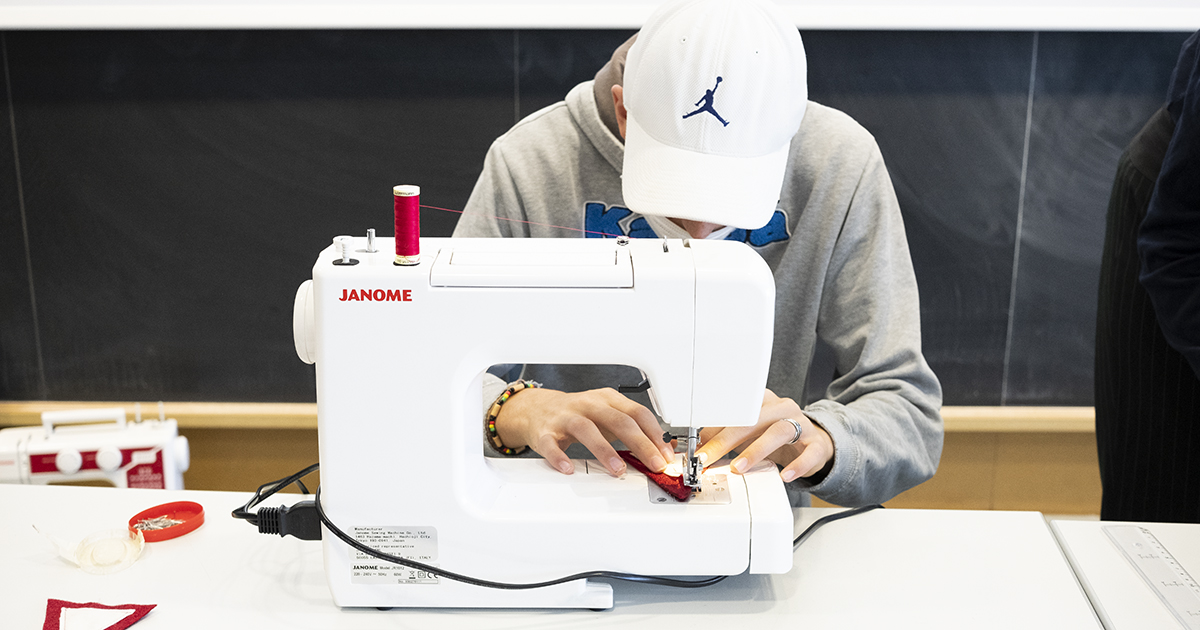
The concept that stands behind our project has its basis on the idea of revaluing artisanship competences – “learning by doing”. These skills stimulate critical thinking and help to better understand the environmental impact of products, production processes and sustainable consumption.
We do a series of workshops, interviews and a guide exemplifies how exploring the art of repairing means laying the groundwork for new ways of using the objects that surround us, trying to overcome the built-in obsolescence and consumerism by doing together.
Student team: Lisa Bachmann, Kseniia Obukhova, Virginia Professione, vprofessione@unibz.it
Partners: OfficineVispa, Giovanni Pascoli high school
Pop up for equality
The strength of the community

Through events that are creative, educative and most of all fun, we want to create a community and build up a network of likeminded young women. A space, where we can lift each other up and collaborate together. The first event will be a guided creative workshop in a bar based in Bolzano‘s Don Bosco, where participants can create their own linocut designs, print and take them home with them.
Student team: Marie Tirard, Marielle Scharfenberg, Vivien Büchele
